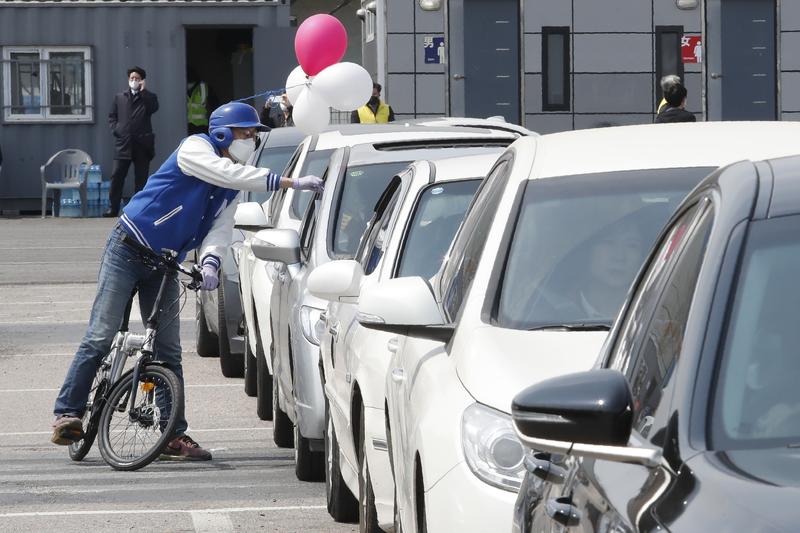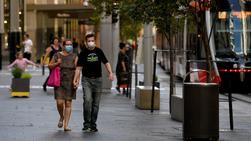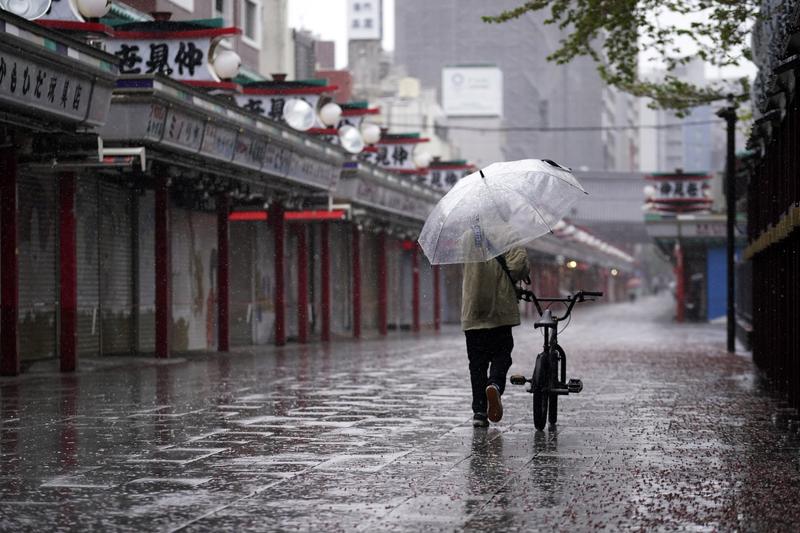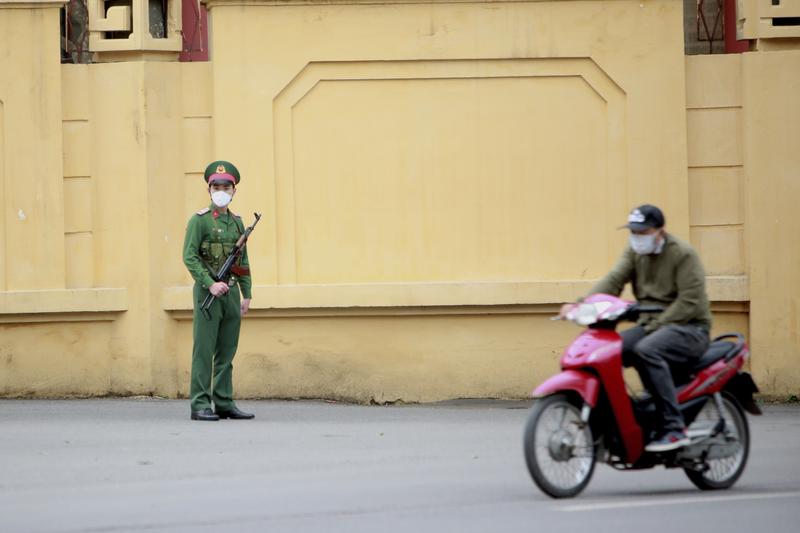
A man wearing a face mask delivers eggs to Christians before a drive-in worship service to celebrate an Easter at a public parking lot in Seoul, South Korea, April 12, 2020. (AHN YOUNG-JOON / AP)
MELBOURNE / HANOI / YANGON / ISTANBUL / AMMAN / JERUSALEM / ULAN BATOR / NEW DELHI / SEOUL / BANGKOK / KABUL - South Korea reported on Monday that at least 116 people initially cleared of the new coronavirus had tested positive again, although officials suggested they would soon look at easing strict recommendations aimed at preventing new outbreaks.
South Korea reported only 25 new cases overall on Monday, but the rise in “reactivated” patients has raised concerns as the country seeks to stamp out infections
South Korea reported only 25 new cases overall on Monday, but the rise in “reactivated” patients has raised concerns as the country seeks to stamp out infections.
Officials are still investigating the cause of the apparent relapses. But Jeong Eun-kyeong, director of the Korea Centers for Disease Control and Prevention (KCDC), has said the virus may have been reactivated rather than the patients being re-infected.
Other experts said faulty tests may be playing a role, or remnants of the virus may still be in patients’ systems but not be infectious or of danger to the host or others.
The 116 cases is more than double the 51 such cases South Korea reported a week earlier.
South Korea plans to send 600,000 coronavirus testing kits to the United States on Tuesday in the first such shipment following a request from US President Donald Trump, a Seoul official told Reuters on Monday.
Government leaders, meanwhile, called on South Koreans to continue to follow guidelines and restrictions on social gatherings, but hinted that such measures could soon be eased.
South Korea has called on residents to follow strict social distancing until at least April 19, but as cases have dropped and the weather has improved, a growing number of people have been flouting the guidelines.
At a meeting on disaster management on Monday, Prime Minister Chung Sye-kyun said the government would soon be looking to loosen the guidelines, which call for people to stay at home, avoid social gatherings of any type, and only go out for essential reasons.
“Later this week, we plan to review our intensive social distancing campaign that we have carried out so far and discuss whether we will switch to routine safety measures” he said.
Some local governments have imposed stricter measures, including closing bars and nightclubs, banning large demonstrations, and limiting church services.
Chung cautioned that even when the restrictions are eased, the country will not return to life as before the outbreak.
“We need a very cautious approach because any premature easing of social distancing could bring irreversible consequences, and have to ponder deeply about when and how we switch to the new system,” he said.
Since Jan 3, the country has tested more than 518,000 people, among whom 494,815 tested negative for the virus and 13,391 were being checked.
 People wearing face masks walk in the empty streets of Sydney's central business district on Easter Saturday in Sydney on April 11, 2020. (SAEED KHAN / AFP)
People wearing face masks walk in the empty streets of Sydney's central business district on Easter Saturday in Sydney on April 11, 2020. (SAEED KHAN / AFP)
Australia
Officials in New Zealand and Australia, hailed globally for their early signs of success in combating the spread of the coronavirus, said on Monday it is too soon to start easing social distancing rules or reopening their economies.
The rate of new coronavirus cases has abated significantly in both countries without straining the capacity of their health systems. New Zealand has enforced a wide-ranging lockdown and Australia is also tightly restricting many activities.
According to Australia’s health ministry, the number of new confirmed cases rose on Monday by 33, the slowest rate in a month and less than a tenth seen two weeks ago
New Zealand recorded its fifth death due to coronavirus on Monday, but new confirmed cases in the Pacific nation of about 5 million rose only by 15, a sixth of what was seen in early April, bringing the total of cases to 1,064.
According to Australia’s health ministry, the number of new confirmed cases rose on Monday by 33, the slowest rate in a month and less than a tenth seen two weeks ago. Australia has now recorded 6,322 cases, with 61 deaths.
Health Minister Greg Hunt said it was too soon to relax restrictions despite the flattening in the curve of cases.”Now is the time to stay the course, to continue with these, self-isolation and social distancing,” Hunt said in televised briefing. “These are producing real reductions in the rate of growth.”
Australia deployed its toughest crackdown yet over the long Easter holiday weekend, with helicopters, police checkpoints and hefty fines used to deter people from breaking a travel ban or breaching public gathering rules.
Australia’s Chief Medical Officer Brendan Murphy told Australian Broadcasting Corp radio the government may start making decisions only “in the coming weeks” about what restrictions, if any, can be relaxed.
New Zealand Prime Minister Jacinda Ardern said a decision on whether to extend the nationwide shutdown and state of national emergency, declared in late March, will be made on April 20.
“Our number of cases may be small, but that doesn’t mean we have yet been successful in hunting this virus down,” Ardern said.
With the economies of both countries taking a severe hit, governments are spending heavily on cushioning the impact.
ALSO READ: Australian police take 'black box' off cruise ship in virus probe
In Australia, which has already pledged spending of more than 10 percent of its annual gross domestic product to help the economy, the government was in talks over the weekend with top carriers Qantas Airways Ltd and Virgin Australia Holdings Ltd about subsidising domestic flights.
New Zealand’s Ardern said her government will be issuing guidance next week on the economy’s ability to recover.
“We are very aware of the need to get our economy running as soon as possible,” she said.
Turkey
President Tayyip Erdogan rejected the resignation on Sunday of Turkey’s interior minister, who said he was stepping down in the wake of a short-notice coronavirus lockdown which sent people rushing to shops to stock up on supplies.
Authorities declared the 48-hour curfew in dozens of cities shortly before 10 pm on Friday, giving millions of people just two hours’ notice and prompting a wave of desperate last-minute buying.
“The incidents that occurred ahead of the implementation of the curfew were not befitting the perfect management of the outbreak,” Interior Minister Suleyman Soylu said in statement on Twitter in which he said he was resigning.
A decision that needs to be taken for public health became a threat to public health due to lack of planning
Faik Oztrak, The opposition Republican People’s Party's spokesman
Erdogan, however, judged it was not “appropriate” for Soylu to resign and the minister would continue in his position, the presidency said shortly afterwards.
Soylu’s statement came just before the end of the weekend lockdown in 31 provinces across Turkey, including its largest city and commercial hub Istanbul, home to 16 million residents.
The opposition Republican People’s Party (CHP) said the way the lockdown was announced had undermined efforts to contain the coronavirus outbreak in Turkey, which has registered 50,000 cases.
“A decision that needs to be taken for public health became a threat to public health due to lack of planning,” CHP spokesman Faik Oztrak said. “The sacrifice of people self isolating for days has been wasted.”
More than 1,100 people have died of COVID-19 in Turkey, many of them in Istanbul where CHP mayor Ekrem Imamoglu said municipal authorities had no advance warning of the move. “Decisions taken without common sense and cooperation will only cause confusion and panic,” he said.The weekend lockdown came on top of existing curbs under which people under the age of 20 and over 65 have been told to stay at home.
Ankara has also halted all flights, restricted domestic travel, closed schools, bars and cafes, and suspended mass prayers. But people have still been going to work to sustain economic activity.
Transport minister Mehmet Cahit Turhan was removed two weeks ago after the ministry drew criticism for holding a tender amid the outbreak to prepare to build a huge canal on the edge of Istanbul.
ALSO READ: S'pore stricter on enforcement to curb spread of virus
Japan
Tokyo saw 91 new cases of coronavirus infections on Monday, Japan’s media reported, as the tally of infections in the country’s capital continues to rise.
Monday’s figure showed a decrease in the rate of daily infections from Sunday, when the Tokyo Metropolitan Government reported 166 new cases. Last week the city announced a state of emergency, requesting residents to stay indoors as much as possible.
 A man walks in the empty Asakusa district Monday, April 13, 2020, in Tokyo. Japanese Prime Minister Shinzo Abe declared a state of emergency last week for Tokyo and some other prefectures to ramp up defenses against the spread of the coronavirus. (EUGENE HOSHIKO / AP)
A man walks in the empty Asakusa district Monday, April 13, 2020, in Tokyo. Japanese Prime Minister Shinzo Abe declared a state of emergency last week for Tokyo and some other prefectures to ramp up defenses against the spread of the coronavirus. (EUGENE HOSHIKO / AP)
Japan’s government said on Monday it saw no reason at the moment to extend its state of emergency beyond Tokyo and a handful of other cities around the country.
“So far we have not been informed of any expert evidence suggesting that the state of emergency should be extended to Hokkaido or other regions,” chief government spokesman Yoshihide Suga told reporters at a briefing.
The central government declared a state of emergency last week, giving legal authority to governors in Tokyo and six other potential virus hotspot prefectures to ask people to stay home and businesses to close, although there are no penalties for non-compliance.
Thailand
Thailand reported 28 new coronavirus cases and 2 new deaths on Monday.
Of the new cases, 18 are linked to previous cases, 7 without connection to old cases, and 3 are Thai nationals who had traveled to South Sulawesi province, Indonesia for a religious gathering last month.
Majority of the new cases are in the capital Bangkok, said Taweesin Wisanuyothin, a spokesman of the government’s Center for COVID-19 Situation Administration.
Since the outbreak escalated in January, Thailand has reported a total of 2,579 cases and 40 fatalities, while 1,288 patients have recovered and gone home.
India
India's health ministry Monday said the death toll due to COVID-19 in India rose to 308 and the total number of confirmed cases in the country reached 9,152.
"As on 8:00 am (local time) today 308 deaths related to COVID-19 have been recorded in the country," said the information released by the ministry.
This is a jump of 35 deaths and an increase of 796 cases since Sunday morning.
According to ministry officials, so far 857 people have been discharged from hospitals after showing improvement.
"The number of active cases in the country right now is 7,987," said the information.
Monday marks the 20th straight day of ongoing 21-day lockdown across the country announced by the government to contain the spread of the pandemic.
The three-week lockdown is expected to end on April 14.
Several states have announced the extension of lockdown until April 30. However, the federal government so far has not made any announcement regarding the extension in nationwide lockdown.
 A motorcyclist passes by a masked officer in Hanoi, Vietnam, April 1, 2020. (HAU DINH / AP)
A motorcyclist passes by a masked officer in Hanoi, Vietnam, April 1, 2020. (HAU DINH / AP)
Vietnam
Vietnam's Ministry of Health on Monday morning confirmed two new cases of COVID-19 infection, bringing the total in the country to 262.
The two new cases, a 60-year-old grocery seller and a 26-year-old male, are reportedly related to earlier confirmed cases and live in Ha Loi village on the outskirt of the capital city of Hanoi that has been under quarantine since Wednesday (April 8) after a villager was confirmed to be infected.
Vietnam had 2,264 suspected cases with over 72,000 being monitored and quarantined as of Monday morning, while 144 patients have recovered with no deaths reported in the country so far, according to the health ministry.
Myanmar
Myanmar reported two more confirmed cases of COVID-19 on early Monday, bringing the total number of infections to 41 in the country, according to a release of Ministry of Health and Sports.
An elderly woman from Bahan township in Yangon who is also a family member of COVID-19 confirmed patients tested positive as she showed symptoms of cough and tiredness on April 12 while being under home quarantine.
Also, a 38-year-old man from Insein township in Yangon tested positive as he showed the symptoms of the infectious COVID-19 after attending a religious event where COVID-19 confirmed patients took part in.
It was learnt that both newly infected patients have no travelling history in the past 14 days.
Myanmar has reported four deaths of fatal COVID-19 disease in the country as of Sunday.
Of the total confirmed patients, 34 patients are in good condition while the other one is being treated at Intensive Care Unit of Waibargi hospital in Yangon and two patients recovered from the disease, the ministry's release said.
According to the recent release of the Ministry of Health and Sports, the quarantine period will be extended to 28 days which include 21-day facility quarantine and 7-day home quarantine.
At present, people in Yangon region are under stay-home period during the holidays of the traditional Thingyan Water Festival which was cancelled, as part of efforts to curb the coronavirus pandemic in the country.
READ MORE: ASEAN ministers to hold video meeting on COVID-19 Tuesday
Mongolia
Mongolia's National Center for Communicable Disease (NCCD) on Monday confirmed one more case of COVID-19, bringing the total number of recorded cases in the country to 17.
"A Mongolian citizen who has been isolated in the NCCD tested positive for COVID-19," Dulmaa Nyamkhuu, head of the NCCD, said at a press conference.
The patient is one of 282 Mongolian citizens who were evacuated from Russia on buses via Altanbulag border point on Saturday over the COVID-19 pandemic, said Nyamkhuu.
In addition, 231 suspected cases tested negative in Mongolia on Sunday, according to the official.
Afghanistan
All the 17 confirmed cases are imported ones and four of them have recovered, according to the NCCD.
A total of 58 new positive cases of the COVID-19 had been confirmed in Afghanistan, bringing the total number of cases in the country to 665, Wahidullah Mayar, a spokesman for the Public Health Ministry, said here Monday.
Talking to reporters, Mayar said that 13 new cases of the COVID-10 were detected in Kabul, 28 in Kandahar and the remaining in other parts of the country.
A total of 21 patients have succumbed to the deadly virus and 38 others have recovered and discharged from hospital since the outbreak of the epidemic in mid February in Afghanistan, Mayar added.
Jordan
Jordan on Sunday extended a month-long lockdown that has closed schools, universities and government agencies until the end of the month to stem the spread of coronavirus, the government spokesman said.
Jordan had registered 389 coronavirus cases and seven deaths as of April 12
Amjad Adailah said Prime Minister Omar Razzaz took the decision in light of “developments and recommendations” related to the pandemic. Medical and essential public services were exempt.
The country announced on March 20 a nationwide curfew that closed shops and prohibited the movement of people. It came days after the monarch enacted emergency law that gave the government sweeping powers to restrict civil and political rights.
Jordan had registered 389 coronavirus cases and seven deaths as of April 12.
The country has been quicker than most in the region to take drastic measures to stem the spread of the virus by imposing a tight lockdown that has brought large sectors of the economy to a standstill.
Israel
Israel locked down mainly ultra-Orthodox Jewish areas of Jerusalem on Sunday to try to contain the spread of the coronavirus from the densely populated neighbourhoods where the infection rate is high.
The entry and exit restrictions, enforced by police roadblocks, were imposed on the same day that a government order for the wearing of masks in public went into effect throughout the country.
Residents of the restricted neighbourhoods in Jerusalem can still shop close to home for essentials. Synagogues have been closed to try to stem infections, as they have been across the country.
The neighbourhoods are home to large families living in close quarters. Compliance with social-distancing guidelines has been spotty.
Bnei Brak, an ultra-Orthodox town of 200,000 near Tel Aviv, was declared a restricted zone on April 2 and police have limited access to the area.
Israel has reported 10,878 confirmed coronavirus cases and 103 deaths. Palestinian officials listed 268 cases in the occupied West Bank and in the Gaza Strip, with two fatalities


